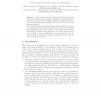Free Online Productivity Tools
i2Speak
i2Symbol
i2OCR
iTex2Img
iWeb2Print
iWeb2Shot
i2Type
iPdf2Split
iPdf2Merge
i2Bopomofo
i2Arabic
i2Style
i2Image
i2PDF
iLatex2Rtf
Sci2ools
WIA
2007
Springer
2007
Springer
Analyzing Ambiguity of Context-Free Grammars
It has been known since 1962 that the ambiguity problem for context-free grammars is undecidable. Ambiguity in context-free grammars is a recurring problem in language design and parser generation, as well as in applications where grammars are used as models of real-world physical structures. We observe that there is a simple linguistic characterization of the grammar ambiguity problem, and we show how to exploit this to conservatively approximate the problem based on local regular approximations and grammar unfoldings. As an application, we consider grammars that occur in RNA analysis in bioinformatics, and we demonstrate that our static analysis of context-free grammars is sufficiently precise and efficient to be practically useful.
| Added | 09 Jun 2010 |
| Updated | 09 Jun 2010 |
| Type | Conference |
| Year | 2007 |
| Where | WIA |
| Authors | Claus Brabrand, Robert Giegerich, Anders Møller |
Comments (0)

